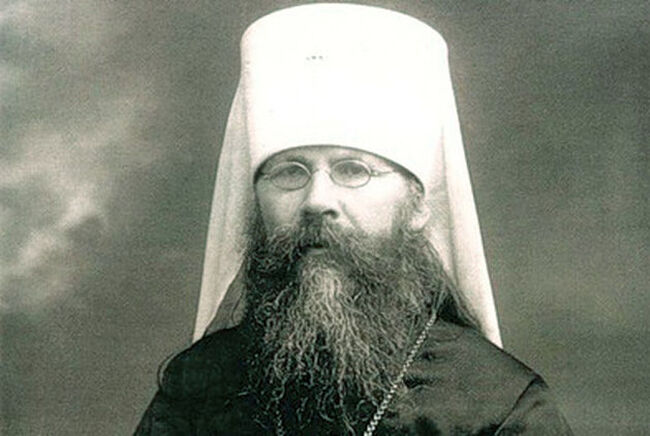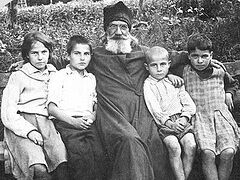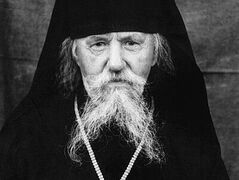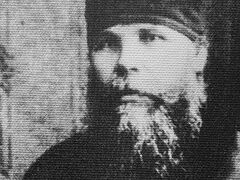Metropolitan Benjamin was arrested on May 29, 1922, and on June 10, began his judicial hearing—which also involved 86 other individuals. What was the official basis for the arrest?
Remember the context of those events: After the civil war ended, when famine struck Russia—in some provinces on a menacing scale—the Bolshevik Central Committee decided to use those conditions as a means of striking a blow at the Orthodox Church. This began with Lenin’s directive, stamped “TOP SECRET” and sent March 19, 1922 through Molotov to the members of the Politburo. It spoke of the development of a unique situation that served as a “justification” before society not only confiscation of church treasures, but the physical elimination of as many clergy as possible: “The more representatives of the reactionary clergy and the reactionary bourgeoisie we are able to execute on those grounds, the better.... Right now is the time for us to teach a lesson to the people in such a way that for decades they will not even dare to think of any kind of opposition.…”
Thereafter, a planned campaign of persecution against the Church was deployed as a “proletarian assault upon Church valuables.”
The “confiscation of valuables” began in Petrograd in March 1922. Metropolitan Benjamin took the only position possible. Setting an example of Christian love, and at the same time bearing witness to the Church’s spirit of peace, he blessed the transfer—for relief of the needy—of those valuables not used in Church services. Thus, Vladyka acted in accordance with the decision of Patriarch Tikhon to avoid sacrilege by keeping those valuables but turning them over to the authorities their cash equivalent. Neither Vladyka Benjamin’s decision nor his words, “We will give everything ourselves”, were in any way signs of weakness. Rather, they demonstrated his exercise of pastoral responsibility.
However, the Petrograd CheKa did not deign to heed Metropolitan Benjamin’s voice and announced that the valuables would be formally confiscated. For them, their action was first and foremost of political significance: In accordance with the directives of the Central Committee, it was important to “neutralize” Vladyka’s authority among the faithful.
The Bolsheviks had reason to fear the personal influence of Metropolitan Benjamin. He was well known to hundreds of thousands of people in Petrograd and beyond its borders, as a very modest and frugal individual, someone not given to avarice.
Born into the family of a village priest in Andreevo, Kargopol’ district, Vasily Kazansky (the future Vladyka Benjamin), knew from personal experience beginning in early childhood the meaning of need and poverty. Years later, as a student in the St. Petersburg Theological Academy, he labored on behalf of the outcasts of society by taking part in acts of charity and participating in the activities of the “Society for dissemination of religious and moral education in the spirit of the Orthodox Church,” primarily directed toward helping workers and the indigent.
His acceptance of the calling to the episcopate in no way changed his cast of mind. Vladyka could often be seen in the most remote and poorest of neighborhoods in the capital, places he would rush to visit as soon as called, as if he were an ordinary parish priest, in a riassa, wearing no sign of his episcopal rank. There, in the midst of poor families, he would be called upon to baptize infants or to see a dying person on his way. He expended no little effort to see that fallen women, disdained by all, might lift themselves up from the utter depths of society, and have an opportunity to correct their way of life. His work in the “Society of the Most-holy Theotokos” enabled many seemingly hopeless lost souls to repent of their sinful life.
Thus, it was not the activities of the Church but the bishop himself that presented a threat to the Soviet powers, for his personal qualities did not fit the image of the “class enemy.”
The grounds for meting out punishment to Vladyka Benjamin was a letter, printed on March 4, 1922 in “Leningrad Pravda,” from 12 individuals who had organized the renovationist/Living Church schism. They accused bishops close to His Holiness Patriarch Tikhon of opposing the confiscation of Church valuables, and of counter- revolutionary conspiracy against the Soviet regime.
The renovationist movement, which was supported by the authorities, had as its goal the supplanting of Orthodoxy with a speculative and opportunistic organization with only the facade of a religious one, an organization that in fact was bereft of the grace of Church Mysteries, and, needless to say, was loyal to the new regime. The blow against Metropolitan Benjamin was part of a calculated policy intended to destroy the Russian Orthodox Church. Patriarch Tikhon was to be deprived of one of his most important assistants.
The baseless and provocative nature of the regime’s actions in Petrograd was recognized even by the workers. The confiscation of liturgical objects provoked considerable unrest. In the Putilov factory church, for example, the workers would not allow the confiscation to take place. In other parishes, as soon as the Soviet commissions arrived, alarm bells would be rung to call the faithful to gather in opposition to the planned actions. Clearly, the sympathies of the faithful were with the legitimate Church authorities. However, in those years, the Bolshevik Central Committee was very selective in its application of the principle of expressing the will of the people.
Metropolitan Benjamin’s restraint and remarkable patience continued throughout the judicial proceedings, to the very last minute, when in a short speech he expressed his attitude towards what had transpired, in and of themselves rebutted all of the slander. “...I do not know what you will announce in your verdict, whether life or death, but whatever you say, I will lift my gaze with the same reverence to the Heavens, will sign myself with the sign of the Cross, and will state, “Glory to Thee, O Lord God, for all things...” Those were the few words that Metropolitan Benjamin spoke in the courtroom.
He meekly accepted the guilty verdict as a Cross uniting him to the Savior…
On July 5, the tribunal announced its guilty verdict, and on the night of August 12/13 of the same year, Metropolitan Benjamin, together with Archimandrite Sergei (Shein), and laypeople Yuriy Novitsky and Ivan Kovsharov, was executed by firing squad on the outskirts of Petrograd.




